By Shihar Aneez
COLOMBO – Sri Lanka’s proposed tax hikes could force professionals out of the country as they discourage people who want to earn more and expand businesses, analysts warn.
President Ranil Wickremesinghe, who is also the island nation’s finance minister, through a gazette has proposed new tax rates, which if passed would bring Sri Lanka’s tax structure almost in line with 2019 before former president Gotabaya Rajapaksa removed many taxes in December that year.
The increase of tax revenue has become a must after the island nation declared sovereign debt default in April, and is now seeking backing from the International Monetary Fund (IMF) for a loan.
Anybody who earns more than 100,000 rupees monthly will have to pay tax in the proposed new tax amendment, at 40% of the earlier threshold. Earning slabs of 500,000 rupee is taxed at an incremental 6% up to 36%.
In addition to this, the corporate tax has been increased to 30% from a maximum of 24%.
However, analysts say the proposed tax hike will be seen as disincentive because President Wickremesinghe is bringing the 2019 tax rates after an economic crisis and when the inflation is running at 70%.
“The sharp increase in personal income tax rates would discourage employment, negatively affect lives of the middle-class families, and especially in an environment of high inflation could increase brain drain,” warned Danushka Samarasinghe, Chief Executive Officer/Director at Nation Lanka Equities (Pvt) Ltd.
“Employees remain disproportionately affected since they are taxed at source with a sharp drop in disposable incomes, which could also create a problem in personal debt servicing. This will be medium-long term negative for the country. A flat personal tax rate could have been more equitable and not discourage growth in incomes,” Samarasinghe added.
He said the tax proposals “seem to be more of a knee-jerk measure in boosting government revenues” in the short term though it could have negative medium-long term impact.
“The 30% tax rate could be a disincentive for investment and job-creation. Sectors which enjoyed preferential tax treatment would be disproportionately affected, though it could be argued as creating a level playing field, which is a positive. Question remains whether this would discourage export-oriented industries and trigger a shift,” he elaborated.
Sri Lanka’s tax to GDP ratio was 12.7% in 2019 when Wickremesinghe was ousted as the prime minister after his party lost the elections to former president Gotabaya Rajapaksa.
The revenue, however, dropped to 8.7% of the GDP in past year after Rajapaksa slashed taxes despite warnings of consequences including a possible debt crisis.
President Wickremesinghe has said the tax rates should be raised to 2019 level to increase the revenue.
“The 2019 tax system is not going to be the same now. Those higher tax rates were affordable at that time because the cost of living was lower and inflation was 6-7%,” a financial analysts said asking not to be named.
“The new tax rates will force to reduce people’s disposable income and this will be a huge burden on the people who have been paying tax genuinely. Many professionals who want to stay in Sri Lanka and contribute to the economy will leave the country.”
Already Sri Lanka has seen many professionals leaving the country due to the unprecedented economic crisis and a prolonged political crisis with many uneducated lawmakers dictating what educated professionals must do with less participatory decision making, analysts pointed out.
They also said with prices of fuel, cooking gas, electricity, and water raised along with over 50% depreciation in the rupee, many professionals have adjusted their consumption to suit the shrunk disposable income.
“These new tax hikes without considering the current inflation and cost of living will be the final nail in the coffin of the careers of professionals locally. They will look into migrate at any cost,” another analyst warned.
-economynext.com



Comments are closed, but trackbacks and pingbacks are open.